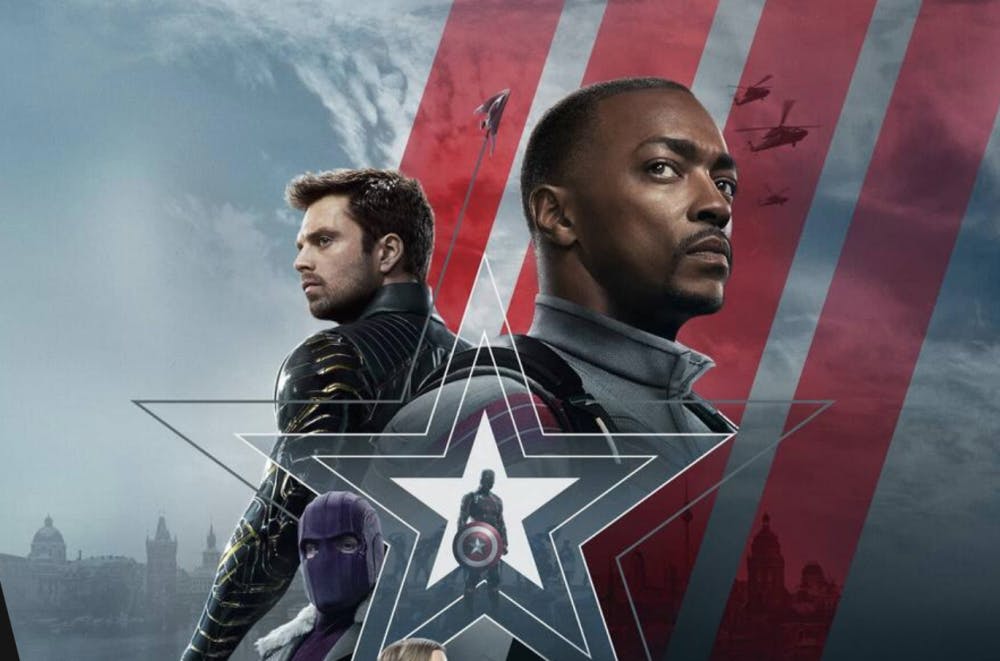By Ariel Steinsaltz
Correspondent
On Friday, Marvel Studios released the pilot episode of its second television show, “The Falcon and the Winter Soldier.” The series centers on two characters from the MCU, Anthony Mackie’s Sam Wilson/Falcon and Sebastian Stan’s Bucky Barnes/Winter Soldier.

Unlike “WandaVision,” which was a bold twist in an entirely new direction for Marvel, this new show falls somewhat more in line with what we’ve seen in the past, though it still explores new areas. The first episode opens with an action sequence of Sam doing contract work for the U.S. Air Force, but the rest of the episode is largely character-focused, which is an important part of storytelling that a show has more time to explore than a movie.
We see what the characters’ lives are like following the events of “Avengers: Endgame;” Sam is working for the Air Force but struggling to keep his family business afloat, and Bucky has been pardoned for his crimes as the Winter Soldier but struggles to make amends for his crimes and reintegrate into civilian society. Sam has also declined to take on the mantle of Captain America, instead giving the shield to the US Government.
Through Joaquín Torres, a friend of Sam’s from the Air Force, we also learn about a sinister group known as the Flag Smashers, who believe life was better during the five years that half of all life in the universe was gone, and want a society with no countries or borders. Torres is injured attempting to break up one of their rallies, likely setting up one of the primary antagonists for the rest of the show.
I found the opening action sequences uninteresting, as it failed to deviate from the somewhat cookie-cutter action sequences that have peppered the MCU, particularly the “Captain America” movies, where both of these characters originated. But once the show veered into the more character-focused sphere, it became a much more compelling story.
One of the big things that the MCU has had to explore is the effects of the Blip, when half of all life in the universe was eliminated by Thanos in “Avengers: Infinity War,” to then be brought back by the Hulk five years later in “Avengers: Endgame.” Endgame itself didn’t have much time to delve into the reality of what such a cataclysmic change would look like for the world, but the projects that have followed, “Spiderman: Far From Home,” “WandaVision,” and now “The Falcon and the Winter Soldier” have all touched on the changes that the events had even once people were returned.
I appreciated the episode’s glimpses into how things are different, such as societies like the Flag Smashers forming, financial issues due to five years of lost income and the world generally being in a state of chaos, which leads the U.S. government to make a move at the end of the episode that angered audiences and will likely be the impetus for the show’s two titular characters to meet up.
If I had one critique of the episode, outside of the aforementioned opening, it would probably be that Sam and Bucky do not meet by episode’s end; for a show with only six episodes, to go the entire first installment without having its two central characters cross paths is a bold move. But the stories they did tell with the characters, including Sam helping his sister with the family business and Bucky going on his first date since 1943, were engaging enough that I didn’t mind too much. I do look forward to seeing them get together in the upcoming episodes, as their dynamic in their film appearances was always entertaining.
One of the focuses of the episode was Bucky’s past as the Winter Soldier, and how the memories of the things he was forced to do still haunt him. He has nightmares about the people he harmed, and has isolated himself from much of the world. He has also befriended the father of a civilian he killed during one of his missions, but has not yet been able to bring himself to tell the man how his son died. This look at how Bucky’s past haunts him is important, and has gone largely unexplored so far; hopefully it will be looked at further as the show progresses.
As far as Sam’s mental state, he believes he is unworthy to be Captain America, despite Steve giving him the shield at the end of “Endgame” and telling him it was his. Presumably, he will learn over time to come to terms with Steve’s legacy and realize that he is worthy of taking up the mantle. In the meantime, though, he remains the Falcon, and will likely have many enemies to face.
Overall, this episode was a strong start to the series with some mild setup for the future and an unexpected but beneficial focus on the characters and their struggles leading into the primary plot of the show. It does a good job of orienting the audience into the world, re-familiarizing people with the characters and leaves me wanting more.







